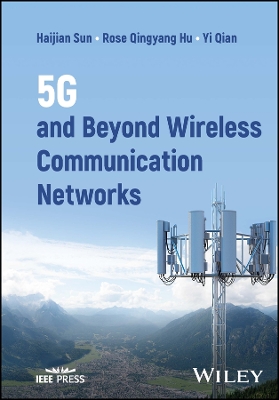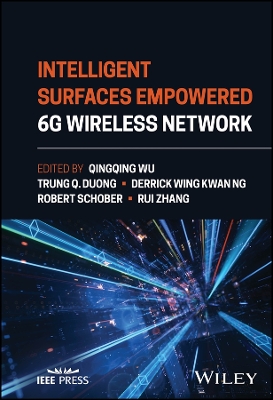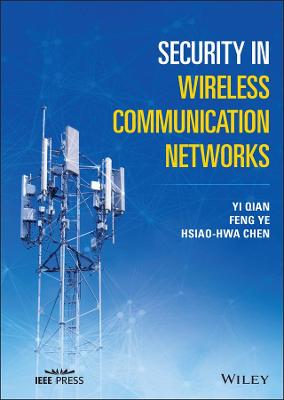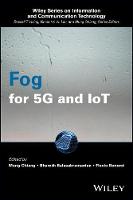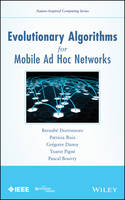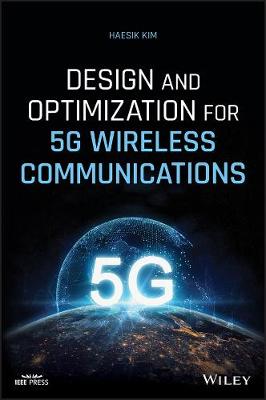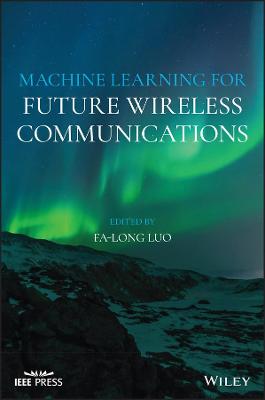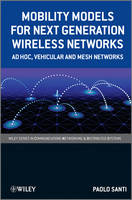Wireless Communications Systems Design
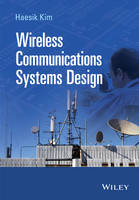 -15%
portes grátis
-15%
portes grátis
Wireless Communications Systems Design
Kim, Haesik
John Wiley & Sons Inc
10/2015
440
Dura
Inglês
9781118610152
15 a 20 dias
777
List of Abbreviations xiii
Part I Wireless Communications Theory 1
1 Historical Sketch of Wireless Communications 3
1.1 Advancement of Wireless Communications Technologies 3
1.2 Wireless Communications, Lifestyles, and Economics 6
References 9
2 Probability Theory 11
2.1 Random Signals 11
2.2 Spectral Density 16
2.3 Correlation Functions 18
2.4 Central Limit Theorem 25
2.5 Problems 28
Reference 30
3 Wireless Channels 31
3.1 Additive White Gaussian Noise 31
3.2 Large?]Scale Path Loss Models 34
3.3 Multipath Channels 38
3.4 Empirical Wireless Channel Models 46
3.5 Problems 48
References 50
4 Optimum Receiver 51
4.1 Decision Theory 51
4.2 Optimum Receiver for AWGN 55
4.3 Matched Filter Receiver 66
4.4 Coherent and Noncoherent Detection 69
4.5 Problems 73
References 74
5 Wireless Channel Impairment Mitigation Techniques 75
5.1 Diversity Techniques 75
5.2 Error Control Coding 82
5.2.1 Linear Block Codes 84
5.2.2 Convolutional Codes 92
5.3 MIMO 99
5.4 Equalization 107
5.5 OFDM 114
5.6 Problems 120
References 121
Part II Wireless Communications Blocks Design 123
6 Error Correction Codes 125
6.1 Turbo Codes 125
6.1.1 Turbo Encoding and Decoding Algorithm 125
6.1.2 Example of Turbo Encoding and Decoding 133
6.1.3 Hardware Implementation of Turbo Encoding and Decoding 149
6.2 Turbo Product Codes 155
6.2.1 Turbo Product Encoding and Decoding Algorithm 155
6.2.2 Example of Turbo Product Encoding and Decoding 156
6.2.3 Hardware Implementation of Turbo Product Encoding and Decoding 174
6.3 Low?]Density Parity Check Codes 175
6.3.1 LDPC Encoding and Decoding Algorithms 175
6.3.2 Example of LDPC Encoding and Decoding 191
6.3.3 Hardware Implementation of LDPC Encoding and Decoding 199
6.4 Problems 205
References 206
7 Orthogonal Frequency?]Division Multiplexing 209
7.1 OFDM System Design 209
7.2 FFT Design 217
7.3 Hardware Implementations of FFT 232
7.4 Problems 237
References 238
8 Multiple Input Multiple Output 239
8.1 MIMO Antenna Design 239
8.2 Space Time Coding 240
8.3 Example of STTC Encoding and Decoding 254
8.4 Spatial Multiplexing and MIMO Detection Algorithms 266
8.5 Problems 276
References 277
9 Channel Estimation and Equalization 279
9.1 Channel Estimation 279
9.2 Channel Estimation for MIMO-OFDM System 293
9.3 Equalization 295
9.4 Hardware Implementation of Channel Estimation and Equalizer for OFDM System 298
9.5 Problems 298
References 299
10 Synchronization 301
10.1 Fundamental Synchronization Techniques for OFDM System 301
10.2 Synchronization Errors 305
10.3 Synchronization Techniques for OFDM System 310
10.4 Hardware Implementation of OFDM Synchronization 319
10.5 Problems 320
References 321
Part III Wireless Communications Systems Design 323
11 Radio Planning 325
11.1 Radio Planning and Link Budget Analysis 325
11.2 Traffic Engineering 335
11.3 Problems 345
References 347
12 Wireless Communications Systems Design and Considerations 349
12.1 Wireless Communications Systems Design Flow 349
12.2 Wireless Communications Systems Design Considerations 353
12.3 Hardware and Software Codesign 370
12.4 Problems 377
References 378
13 Wireless Communications Blocks Integration 379
13.1 High Level View of Wireless Communications Systems 379
13.2 4G Physical Layer Systems 383
13.2.1 LTE 384
13.2.2 WiMAX 394
13.2.3 Comparison of LTE and WiMAX 400
13.3 SoC Design for 4G Communication System 401
13.3.1 Software Design for 4G Communication System 403
13.3.2 Hardware Design for 4G Communication System 404
13.4 Problems 409
References 410
Index 411
List of Abbreviations xiii
Part I Wireless Communications Theory 1
1 Historical Sketch of Wireless Communications 3
1.1 Advancement of Wireless Communications Technologies 3
1.2 Wireless Communications, Lifestyles, and Economics 6
References 9
2 Probability Theory 11
2.1 Random Signals 11
2.2 Spectral Density 16
2.3 Correlation Functions 18
2.4 Central Limit Theorem 25
2.5 Problems 28
Reference 30
3 Wireless Channels 31
3.1 Additive White Gaussian Noise 31
3.2 Large?]Scale Path Loss Models 34
3.3 Multipath Channels 38
3.4 Empirical Wireless Channel Models 46
3.5 Problems 48
References 50
4 Optimum Receiver 51
4.1 Decision Theory 51
4.2 Optimum Receiver for AWGN 55
4.3 Matched Filter Receiver 66
4.4 Coherent and Noncoherent Detection 69
4.5 Problems 73
References 74
5 Wireless Channel Impairment Mitigation Techniques 75
5.1 Diversity Techniques 75
5.2 Error Control Coding 82
5.2.1 Linear Block Codes 84
5.2.2 Convolutional Codes 92
5.3 MIMO 99
5.4 Equalization 107
5.5 OFDM 114
5.6 Problems 120
References 121
Part II Wireless Communications Blocks Design 123
6 Error Correction Codes 125
6.1 Turbo Codes 125
6.1.1 Turbo Encoding and Decoding Algorithm 125
6.1.2 Example of Turbo Encoding and Decoding 133
6.1.3 Hardware Implementation of Turbo Encoding and Decoding 149
6.2 Turbo Product Codes 155
6.2.1 Turbo Product Encoding and Decoding Algorithm 155
6.2.2 Example of Turbo Product Encoding and Decoding 156
6.2.3 Hardware Implementation of Turbo Product Encoding and Decoding 174
6.3 Low?]Density Parity Check Codes 175
6.3.1 LDPC Encoding and Decoding Algorithms 175
6.3.2 Example of LDPC Encoding and Decoding 191
6.3.3 Hardware Implementation of LDPC Encoding and Decoding 199
6.4 Problems 205
References 206
7 Orthogonal Frequency?]Division Multiplexing 209
7.1 OFDM System Design 209
7.2 FFT Design 217
7.3 Hardware Implementations of FFT 232
7.4 Problems 237
References 238
8 Multiple Input Multiple Output 239
8.1 MIMO Antenna Design 239
8.2 Space Time Coding 240
8.3 Example of STTC Encoding and Decoding 254
8.4 Spatial Multiplexing and MIMO Detection Algorithms 266
8.5 Problems 276
References 277
9 Channel Estimation and Equalization 279
9.1 Channel Estimation 279
9.2 Channel Estimation for MIMO-OFDM System 293
9.3 Equalization 295
9.4 Hardware Implementation of Channel Estimation and Equalizer for OFDM System 298
9.5 Problems 298
References 299
10 Synchronization 301
10.1 Fundamental Synchronization Techniques for OFDM System 301
10.2 Synchronization Errors 305
10.3 Synchronization Techniques for OFDM System 310
10.4 Hardware Implementation of OFDM Synchronization 319
10.5 Problems 320
References 321
Part III Wireless Communications Systems Design 323
11 Radio Planning 325
11.1 Radio Planning and Link Budget Analysis 325
11.2 Traffic Engineering 335
11.3 Problems 345
References 347
12 Wireless Communications Systems Design and Considerations 349
12.1 Wireless Communications Systems Design Flow 349
12.2 Wireless Communications Systems Design Considerations 353
12.3 Hardware and Software Codesign 370
12.4 Problems 377
References 378
13 Wireless Communications Blocks Integration 379
13.1 High Level View of Wireless Communications Systems 379
13.2 4G Physical Layer Systems 383
13.2.1 LTE 384
13.2.2 WiMAX 394
13.2.3 Comparison of LTE and WiMAX 400
13.3 SoC Design for 4G Communication System 401
13.3.1 Software Design for 4G Communication System 403
13.3.2 Hardware Design for 4G Communication System 404
13.4 Problems 409
References 410
Index 411



